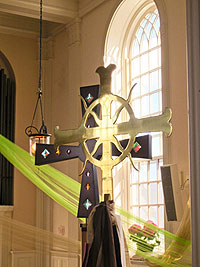When white smoke rose over the Vatican on the evening of March 13, it seemed almost everyone had an opinion about the announcement of Cardinal Jorge Bergoglio of Argentina as the next supreme head of the Roman Catholic Church. Facebook statuses were updated, front-page articles were prepared, and even President Barack Obama sent a congratulatory tweet.
 But the selection of Pope Francis had personal significance for Catholic faculty, staff, students, and alumni of Yale Divinity School, who joined with the Church’s global population in considering what the future holds under this new faith leader. Whether in formal interviews or classroom conversations, YDS Catholics have discussed what awaits the Roman Catholic Church during Pope Francis’s papacy.
But the selection of Pope Francis had personal significance for Catholic faculty, staff, students, and alumni of Yale Divinity School, who joined with the Church’s global population in considering what the future holds under this new faith leader. Whether in formal interviews or classroom conversations, YDS Catholics have discussed what awaits the Roman Catholic Church during Pope Francis’s papacy.
Janet Ruffing, professor in the practice of spirituality and ministerial leadership, was interviewed on the “Richard French Live” public affairs talk show before the conclave began. In the segment, she emphasized the necessity for a pope to address the needs of the whole church, as Catholics become increasingly concentrated in the Global South.
Ruffing, who is also a Roman Catholic nun, celebrates Pope Francis’s valuable Latin American worldview and feels he is equipped to address many of the concerns she expressed in her RFL interview. “He is keenly aware of the effect of globalization on poor people in third world countries, and…brings very strong pastoral experience to the papacy,” she said.
Though doubtful that Pope Francis will be able to solve such controversial issues as women’s role in the Church, Ruffing still sees in him the markings of a reformer. “When he appeared at the [Vatican] window and asked for the blessing of the people gathered in the piazza, I cried because he was acknowledging that the church is not just the pope and hierarchy, but also everyone else as well. This, to me, signals his espousal of Vatican II’s teaching on the church as the people of God.”
She continued, “I am hopeful in the present moment that the church is in a self-correcting mode…Pope Francis has focused primarily on the Gospel itself and expects it to have concrete effects personally, spiritually, and socially.”
Teresa Berger, professor of liturgical studies, echoed Ruffing’s emphasis on the role Gospel teachings have played in the early weeks of Pope Francis’s pontificate. She said, “I am very hopeful that this will be a pastoral ministry, one in which the Gospel message shines forth in all its brilliant simplicity again.”
In an interview with Radio Free Europe, Berger noted that Pope Francis’s years of ministerial work complement his doctorate in theology, perhaps making him uniquely capable of tackling the controversies within the Church today. Harold Attridge, former dean of YDS and Sterling professor of divinity, added that Pope Francis is already recognized as an effective administrator, suggesting that, “He may be able to address issues of governance at the papal level.”
Berger and Attridge agree with Ruffing in their sense that Pope Francis will make few, if any, doctrinal changes, but both spoke about the options that exist regarding practical matters.
“His comments on the fact of married clergy in the churches of the East, both orthodox and Catholic, suggest that he may be open to change on the matter of priestly celibacy, which is not a matter of doctrine,” said Attridge.
Berger described the need for reform within the Roman curia, explaining that Pope Francis has already made choices, such as appearing in the plain white papal robe, that signal a return to simpler traditions. “He seems very determined to do his own spring cleaning among all the clutter that has accrued to the papal office over the years—and centuries!” she said.
Chris Washnock, ’14 M.A.R., and Elizabeth Gleich, ’14 M.A.R., the incoming co-presidents of the Roman Catholic Fellowship at YDS, represent a younger generation of Catholics who are equally optimistic about the future of the Church under Pope Francis’s guidance.
“I believe that, in some ways, Pope Francis is exactly what the Catholic Church needs right now, with his emphasis on simplicity and his focus on the care of the poor and vulnerable,” said Gleich. She calls for a Vatican that will truly listen to the voices of its lay members, and longs for a leader who will address the status of women. While she, too, doubts Pope Francis’s capacity to enact doctrinal change, she applauds his apparent pragmatism.
“In a population as slow-moving, global, and diverse as the Catholic Church, I optimistically assert that Pope Francis is the best we can get right now,” she said.
Washnock explained that the work of this papacy should be about much more than debates over sexual ethics and priestly celibacy. He predicts that Pope Francis’s legacy will involve matters of global economic inequality and international development.
“Given Pope Francis’s early overtures toward the poor, I believe that we can look forward to a papacy full of surprises, as well as movement towards a more approachable, egalitarian Vatican administration,” Washnock explained. “I believe that he will be able to affect change not only within the walls of the Vatican—which itself will be a difficult task—but also on the streets of Buenos Aires, Yaounde, and beyond.”
As the first Latin American pope and the first to belong to the Jesuit order, much remains unknown about the sort of spiritual guide Pope Francis will prove to be. But the mood among the YDS Catholic community is most resoundingly a sense of hope.
| Attachment | Size |
|---|---|
| 4.67 KB |